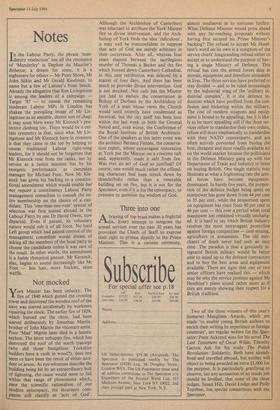Three into one
Abraying of top brass makes a frightful din. Every attempt to integrate the armed services over the past 30 years has provoked the Chiefs of Staff to exercise their right to protest directly to the Prime Minister. This is a curious ceremony,
almost mediaeval in its tortuous futility. What Defence Minister would press ahead with any far-reaching proposals without having first secured his Prime Minister's backing? The refusal to accept Mr Hesel- tine's word on its own is a symptom of the service chiefs' longstanding refusal either to accept or to understand the purpose of hav- ing a single Ministry of Defence. This refusal has cost the armed forces dear in morale, equipment and therefore ultimately in lives. The three services have preferred to stay divided — and to be ruled increasingly by the industrial wing of the 'military in- dustrial complex'. It is the defence in- dustries which have profited from the con- fusion and bickering within the military. The cost of modern weapons and equip- ment is bound to be appalling, but it is like- ly to be more appalling still if the three ser- vices refuse to standardise their own orders, refuse still more emphatically to standardise with their NATO counterparts, and are often actively prevented from buying the best, cheapest and most readily available kit on the world market because the politicians in the Defence Ministry gang up with the Department of Trade and Industry to insist on buying British. One single statistic may illustrate at what a frightening rate the arm- ed forces have become equipment- dominated. In barely five years, the propor- tion of the defence budget being spent on manpower has gone down from 44 per cent to 35 per cent, while the proportion spent on equipment has risen from 40 per cent to 46 per cent — this over a period when total manpower has remained virtually unchang- ed. It is hard to say which British industry receives the most extravagant protection against foreign competition — coal-mining, agriculture or armaments. The old mer- chants of death never had such an easy time. The paradox is that a genuinely in- tegrated British military would be better able to stand up to the defence contractors and to buy the best arms and equipment available. There are signs that one or two senior officers have realised this — which may be why the service protests against Mr Heseltine's plans sound rather more as if they are merely showing their respect for a British tradition.














































 Previous page
Previous page